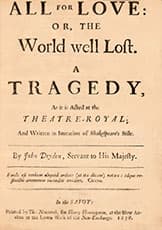All for Love
Critique • Quotes
 First edition
First editionSubtitle
Or, the World Well Lost
First performance
1677
Literature form
Play
Genres
Tragedy
Writing language
English
Author's country
England
Length
Five acts
Improving on Shakespeare
John Dryden's tragedy, All for Love, is basically a retooling of William Shakespeare's Antony and Cleopatra.
You won't find Shakespeare's Cleopatra drama on the list of greatest plays, as it's not one of the Bard's very best. It's more in the middle of the pack, partly due to its wide-flung characters and its complicated subplots of battles, intrigues and counter-intrigues among figures who don't make much of an impression.
The play is acclaimed for presenting one of Shakespeare's most complex portrayals of a woman, namely the titular Egyptian queen—she of the famous "infinite variety". But until Cleopatra takes centre stage near the end of the play, the production is all over the place, so much so that critics still argue over whether the work is a tragedy, a comedy, a romance, a history or something else.
However, about seventy years after Antony and Cleopatra made its debut, and about sixty years after Shakespeare's death—and after the English world had been turned upside down several times and everyone had lived through decades of warfare and intrigues and counter-intrigues of their own—the poet Dryden took another stab at the well-known story. And this time it was a throwback to even older dramatic principles.
A few days in a love match
All for Love adheres to the Aristotelian unities, especially those of place and time. So instead of ranging all across the Roman and Egyptian empires over many years, with all those jump cuts between scenes found in Shakespeare's version, Dryden's story is confined to Egypt's capital city Alexandria and a few days in the Cleopatra-Antony relationship. (Actually, the Greek unities call for everything to take place in a single day, but this would have been unworkable.) And the play focuses on that relationship, trimming the subplots and more than halving the number of characters, to present a sort of unity of action.
And it is a tragedy in the classical sense. No doubt about it.
By necessity, the characters are more simply drawn—for example, there's less time to illustrate Cleopatra's multi-faceted personality. And Antony's many sides, expressed through massive changes of direction every few minutes, make him come across as flighty.
In the final analysis though their relationship is simple. The play's theme is summed up in the full title, All for Love, or, the World Well Lost. In other words, they gave up the world for love and good on them. Though, as in Shakespeare's Romeo and Juliet, the lovers don't share a romantic goodbye to the world but die separately through a series of misunderstandings.
Along the way they each have a small group of people trying to save them from their tragic fate. On the Roman side, Antony is wooed away from Cleopatra by his general Ventidius, by his friend and Caesar's general Dolabella, and by his wife Octavia, who is also Caesar's sister—initially successfully in all cases.
On the Egyptian side, Cleopatra is advised by her ladies in waiting, by her eunuch Alexas on stratagems to keep Antony—which prove disastrous—as well as by Octavia again, who inexplicably turns up in Egypt to argue with her rival for Antony's loyalty.
Curriculum alternative
Of course, beyond the question of whether Dryden or Shakespeare structures the drama better, is the quality of the poetry—the plays' dialogue—both predominantly written in iambic pentameter. In attempting to emulate the "divine" Shakespeare, as he calls him, Dryden gave up his previous rhyming style to write black verse in this effort.
So who's the better writer? Well, Shakespeare of course. But many a modern reader or playgoer may find Dryden's simpler, more cynical dialogue easier to follow, and thus more entertaining.
No wonder for a couple hundred years Dryden's version of the Antony and Cleopatra story was overwhelmingly preferred by audiences and theatre troupes. The Stratfordian's play only pulled ahead in the number of productions when the playwright's work as a whole was rediscovered.
When I went to high school Antony and Cleopatra was on the curriculum, as one of the handful of Shakespearean plays we covered in English Literature classes. I'm sure no one considered replacing it with the play by John Dryden, but it might have made for an interesting experiment to see if students would take to it more easily.
Note, I'm not claiming All for Love is the better play—or better (whatever that means) than anything by Shakespeare—but for many of us it's likely the more accessible play.
— Eric
Critique • Quotes

